- Home
- Marcia Talley
Daughter of Ashes Page 3
Daughter of Ashes Read online
Page 3
Elizabethtown’s town square was dominated by a war memorial, a gray-stone obelisk rising like a miniature Washington Monument from the center of a three-layered concrete wedding cake. But the nearby bandstand, decorated in vibrant colors like a circus carousel, easily stole the show, adding a whimsical high Victorian touch to what was otherwise a rather staid little Georgian town.
We hustled along High Street, past the hotel that used to be a bank and now – according to a sign in the window – served afternoon tea on chintz tablecloths from three to five o’clock in the vault. The office of Barfield and Williams came next, their windows plastered with listings of area homes for sale, including, inexplicably, the one we had so recently ‘lost.’ I made a rude noise and hurried on. An attorney at law, an antiques store that specialized in restoration hardware – I made a mental note – and … I grabbed Paul’s arm. We were standing in front of a store called Passionknit. ‘Check out the yarn,’ I breathed.
Paul frowned. ‘Do I have to?’
‘No, but I think that bright red merino and silk blend they have heaped in the window would look great on you.’
‘Matches my eyes?’
‘Hah!’ I said.
‘I don’t need any more sweaters, Hannah. And you have more yarn in the guest room closet than you could knit up in two lifetimes.’
I felt my face flush. Paul was right. I couldn’t knit it all up in three lifetimes, but whenever one of the mail-order companies I did business with had a bag sale … well, just hang a sign around my neck that read Sucker!
‘Maybe they carry patterns,’ I suggested. ‘For the yarn I already have. And buttons.’
Paul tugged me away from the window. ‘I’m sure they do, Hannah, but there’ll be plenty of time to explore that later. Besides, didn’t you tell me you were starving?’
‘A turtleneck maybe? Irish style, with cables?’ When on a mission, I was sometimes hard to turn.
‘Hannah …’
With Paul’s hand firmly grasping my elbow, we moved on.
The High Spot was crowded with men and women dressed in business casual attire – there, I presumed, on a mid-morning coffee break. Wet umbrellas had been tipped into an oversized brass spitoon near the door while raincoats and slickers dripped from hooks along the wall nearby. Several yummy mummies shared an industrial-sized blueberry muffin at a table near the coffee fixings bar, their strollers angled into a corner, the babies they contained blissfully asleep. After depositing our umbrellas in the spittoon, Paul and I dosidoed around two guys wearing red Comcast polo shirts as they hustled out the door, handheld radios crackling, on a mission of mercy for some poor cable television customer or another. We scanned the busy café, looking for Caitlyn.
Caitlyn had already snagged a table for four in a quiet corner near the narrow hallway that led, according to a sign, to the ‘Caballeros’ and ‘Señoras,’ although there was nothing remotely Spanish about the High Spot’s décor, unless you counted the cans of Red Bull I saw chilling in the drinks cooler. She waved us over. ‘Coffee?’ she asked before we even had a chance to pull out a chair and sit down.
‘Please,’ I said.
‘If it’s regular,’ she said, pointing to two urns on a table near the back, ‘just help yourself. Double soy skinny latte or something fancy like that, you gotta stand in line.’
‘Regular’s fine with me,’ I said. ‘Why don’t I get it while you and Paul make small talk.’ I aimed myself urn-ward. ‘But don’t say anything important until I get back.’
When I returned, carrying two steaming mugs, with sugar packets and creamer tubs tucked into my pocket, Caitlyn already had papers spread out on the table next to her open laptop. I set Paul’s coffee down carefully between two important-looking piles and took a seat. ‘This is happening so fast,’ I said. ‘Doesn’t there have to be a title search or something?’
Caitlyn beamed. ‘In a small town these things can be expedited. It’s all in knowing who to call.’ She snapped her fingers. ‘I do a favor for someone, they do a favor for me.’
‘So, we’re good to go?’ Paul asked.
‘Yup,’ she said, offering him a pen.
I cradled the mug between my palms, appreciating its warmth, watching while Paul flipped through several pages of the contract. He read, flipped back, read some more, then turned to one of the pages marked with a red plastic tab. He smoothed the document out on the table. ‘Well,’ he said at last, reaching for the pen Caitlyn was holding. He caught my eye and waggled both brows. ‘Looks like everything’s in order here.’
‘We’re really going to do this, aren’t we, Paul?’ I said.
‘We are.’ Paul leaned over the document and signed his name with a flourish, then shoved the papers toward me. ‘Your turn.’
I signed the documents, too, in triplicate, on the blank line under my husband’s expansive scrawl that looked for all the world as if he’d written Pralines. The owner had already signed, I noticed. Her old-fashioned signature would have been perfectly legible even if it hadn’t been typed in capital letters below the blank: Julianna Quinn. A notary seal pressed into the document attested to its authenticity.
‘There!’ I said, pushing the contracts in Caitlyn’s direction. ‘Are we done?’
‘Not quite,’ Paul interjected, reaching for the checkbook he’d tucked into his breast pocket. He’d written the check at home, so all he had to do now was tear it out and … He handed it over to Caitlyn. ‘Now we’re done.’ He reached over, took my hand and held it. ‘Looks like my wife and I have bought a house.’
‘You have,’ Caitlyn said. She handed Paul one of the signed contracts, then tucked our check under the binder clip that held the two remaining copies of our contract for Legal Ease together. She slid the whole packet into the briefcase she had balanced on her knees.
But her hand didn’t emerge from the depths of the briefcase empty. Paul noticed it first and gave me a nudge. I reached out and took a set of keys from Caitlyn’s outstretched fingers. I folded them into my palm, kissed them for good luck and pressed my hand to my heart.
Paul smiled at the melodrama, then turned his attention back to Caitlyn. ‘We’ll need a contractor. Who do you recommend?’
Caitlyn was prepared with another piece of paper, which she handed to my husband. ‘I’ve written down several names but I wouldn’t like to recommend one over another.’ She grinned. ‘It’s a small town. I have to live and work here.’
‘I understand,’ Paul said. ‘But if it were your house, who would you call?’
‘They’re all reliable, Paul, but if you’ll notice, the list isn’t in alphabetical order. I’d start at the top. Just sayin’.’
After Caitlyn had left, I examined the keys – our keys. There were three on a key ring bearing the Barfield and Williams logo, each tagged with a white disk. I fingered them lovingly, like charms on a bracelet. Front door. Garage. And a third surprise addition to the family: Tool shed.
Eventually, Paul and I ordered lunch. As the waitress was clearing away our plates, I considered the key ring nestled safely in the handbag hanging by its strap from the back of my chair. The High Spot specialty I’d enjoyed – a Gabby Crabby sandwich – seemed an anti-climax. But that was no reason not to order dessert. We were celebrating, after all.
FOUR
‘Alonso of Aragon was wont to say in commendation of age, that age appears to be best in four things – old wood best to burn, old wine to drink, old friends to trust, and old authors to read.’
Francis Bacon, Apophthegms New and Old, 134
The High Spot’s bread pudding should come with a warning label. Shot through with raisins and smothered in a sauce of hot buttered rum, you can practically feel your arteries clogging. Even though Paul had the metabolism of a wolverine, I matched him bite for bite.
Paul flagged down the waitress and requested the check while I excused myself to visit ‘the Señoras.’
I had just settled myself when a voice from the adjoining stall chi
rped, ‘Hi, how are you?’
I thought for a moment about ignoring the woman’s question, but my mother had taught me better manners. ‘I’m fine, thank you.’
‘So, what are you up to?’ she said.
‘Just doing what comes naturally,’ I replied, reaching for the toilet paper.
‘Can I come over?’
I shot to my feet, re-buttoning my jeans as quickly as I could. ‘No! Sorry. Husband’s waiting. Gotta run.’
‘Listen,’ the woman said as I made quick work of washing my hands. ‘I’ll have to call you back. There’s this weirdo in the next stall that keeps answering all my questions.’
She’s on the phone. Wiping my hands dry on my jeans, I made a quick escape before the woman could emerge and get a positive I.D. If I were going to live in this town, it wouldn’t do to get a reputation as a pervert from day one.
‘What’s so funny?’ Paul asked when I returned to the table.
‘Tell you later,’ I promised as the waitress appeared with the check.
We were laughing over the incident, lingering over our coffee when Paul set his mug down on the bare tabletop with a solid clunk. ‘Hannah, look over there. Isn’t that Fran?’ He jerked his head in the direction of the cashier where a woman stood, head bowed over her handbag as she rummaged about inside as if searching for small change.
Fran Lawson, my former boss at Whitworth and Sullivan, had a helmet of hair the color of flat-black patio furniture. This woman was the height and shape of Fran, as I remembered her, but her silver hair was stylishly cut, floating just above the collar of her crisp, white camp shirt like well-behaved cotton candy. ‘I don’t think so,’ I started to say, and then the woman found what she was looking for, handed it to the cashier and turned her head to the left.
I’d seen that chiseled profile thousands of times – talking on the telephone, issuing instructions to the housekeeping staff, presiding over meetings where she was usually cutting funding for one damn fool reason or another. I hadn’t seen Fran for more than a decade, not since she’d laid me off – along with half a dozen of my colleagues – in a firm-wide reduction in force.
I ducked my head and whispered, ‘Maybe she won’t recognize me.’
No such luck.
‘Hannah!’ a familiar voice shrilled, as irritating as I remembered it.
‘Too late,’ Paul chuckled, genuinely amused at my dilemma. ‘She’s heading our way.’
I looked up and forced a smile. ‘Fran! Oh, my gosh! Fancy meeting you here!’
‘I could say the same thing, Hannah.’ She set her mug down on our table, pulled out the chair that Caitlyn had so recently vacated and sat down uninvited. ‘I retired from the rat race last year,’ she explained. ‘Steve and I bought a house on Congress Street, not far from the water.’
‘Paul and I just closed on a cottage on Chiconnesick Creek,’ I told her, secretly relieved that we wouldn’t be close neighbors. If Fran ran her house the way she’d run the office all those years ago, she’d be cutting her lawn a blade at a time with cuticle scissors, measuring the exact distance between tomato seedlings in her garden and bitterly complaining should the pollen from your dogwood tree have the audacity to drift over into her yard.
‘Wonderful!’ Fran exclaimed. Turning to Paul, she said, ‘You’re retired now, too?’
‘I wish,’ he snorted. ‘No, I’ve got a few years left. Hannah and I will be working on the place. Legal Ease – maybe you know it?’ When Fran shook her head, he continued, ‘It’s a bit of a fixer-upper, I’m afraid, but at least it will keep us busy and off the streets.’
‘Well, if you need work done, you can’t do better than Heberling and Son. Dwight converted our garage into a practice studio for Steve, and we couldn’t be more pleased.’
Steve Lawson, as I recalled, was a conservatory trained cellist who played first chair with several community orchestras in the Baltimore–Washington metropolitan area.
‘So, your husband’s still teaching?’ I asked.
Fran nodded. ‘We have a local symphony in Elizabethtown, too. Small, mostly volunteer – a chamber orchestra, really, but not at all bad.’ She paused as a thought occurred to her. ‘Say, there’s a concert at St Timothy’s three weeks from Saturday. They’re performing Mozart’s Violin Concerto Number Four in D major and Mendelssohn’s Italian Symphony. You should try to attend.’
‘We will,’ I promised, actually looking forward to the concert. ‘If we’re going to be spending more time here, I’d like to get involved with the community.’
Fran placed her hands flat on the tabletop. ‘I’m so glad to hear you say that, because …’ She paused, looked right and left, then shot a glance over her shoulder as if checking for eavesdroppers. She leaned forward and practically whispered, ‘Let me tell you what was found in the county courthouse.’
‘Not a body, I hope,’ Paul said with a warning glance at me. He’d come close to losing me in a couple of misadventures involving bodies and he wasn’t eager to repeat the experience.
Fran chuckled. ‘No, not a body, although Elizabethtown is so old that finding a body tucked away in a building as ancient as our courthouse wouldn’t surprise me in the least. Not a body at all, but something just as interesting to people who love history the way we do.’
‘Now you’ve aroused my curiosity,’ I said, leaning forward on my elbows, hoping to encourage her.
‘It’s a long story.’ She turned a thousand-watt smile on Paul and shoved her mug in his direction. ‘Would you mind fetching me a refill while I fill Hannah in?’
Paul stood, shoving his chair back with his knees, seemingly unconcerned about Fran’s summary dismissal, perhaps figuring I’d clue him in later. ‘Cream? Sugar?’
‘Both, please.’
After Paul left, Fran continued, ‘Our county clerk retired last December. She’d been in charge at the courthouse for decades. Very old fashioned and not at all computer-savvy, as one might imagine. I was on the search team for her replacement – for my sins.’ She laughed, or rather barked, at her own clever turn of phrase.
‘After a long search, we eventually hired a young gal named Kimberly Marquis. She worked for the National Archives out in their Greenbelt annex. Not my first choice, mind you, but she’s competent enough.’ Fran sighed and rolled her eyes. ‘What can you expect for the salary the county was prepared to pay, I ask you.’
She paused as Paul returned, then reached out for her refill. ‘Thank you, Paul.’
After taking a sip, Fran said, ‘Anyway, new broom sweeping clean and all that, Kim was down in the basement clearing things out when she discovered a door marked Storage. It obviously hadn’t been opened in years, Hannah. Rusted lock had to be pried off with a screwdriver. Cobweb city and acres of dust everywhere.’ She took another sip of her coffee and considered me over the rim of the mug. Was the woman ever going to get to the point?
‘And …?’ I prompted.
Fran set her mug down on the table. ‘When she finally got the door open, Kim found a room full of old records. Leather-bound ledgers, boxes stuffed with file folders, card files, old newspapers and magazines, you name it. Naturally, she called me in. Just a cursory glance, of course, but from what I could tell, some of the papers date back to the early days of the nineteenth century.’
I sat back. ‘Wow.’
‘Exactly. The present courthouse was built in 1845, and there was an earlier one before that, so who knows what we’ll discover down there. The records could have been there since Maryland was a colony still kowtowing to King George the Third.’
‘How come nobody knew about them?’ Paul asked.
‘Oh, Kimberly’s predecessor knew, all right. Had to. That storage room is directly under the courthouse bathroom. At some point there was a leak in one of the toilets and many of the records got soaked.’
From long experience as a records manager at Whitworth and Sullivan, I knew where this was going. ‘Uh oh. Mold?’
Fran nodded. ‘You got it
. After the plumbing was repaired, the stupid woman obviously closed the door and put the storage room out of her mind.’
‘Are the records valuable?’ Paul wanted to know.
Fran shrugged. ‘Hard to say until they’ve been examined. That’s where I come in, Hannah. You, too, if you’re interested.’
‘Examined? What does that entail?’ Paul asked.
‘Sort, evaluate,’ I said, cutting to the chase. ‘Make recommendations on what to retain and what to discard. Send some on to the Maryland State Archives in Annapolis, I imagine. Keep or discard the rest.’
‘Anything deemed to be of historical value will eventually need to be cataloged,’ Fran added, ‘so that it can be made available to researchers. And the minute word leaks out about this discovery, genealogists are going to be clambering all over us like untrained puppies, trust me. We’ll need to be prepared.’
When I didn’t say anything for a moment, Fran gave me a nudge. ‘It’s right up your alley, Hannah.’
That was certainly true, but I’d worked for Fran before and I wasn’t sure I wanted to repeat the experience.
‘I don’t know,’ I said, risking a sideways glance at my husband, who sat as still as a garden gnome, a half smile tugging at the corners of his lips. He was enjoying my dilemma, the rat.
‘I have another volunteer,’ she said, sweetening the pot. ‘You’ll like him. He’s a local guy named Thomas Hazlett, but everybody calls him “Cap.”’
‘Is Cap a waterman?’ Paul wanted to know.
Fran shook her head. ‘No, an army vet. No archival training, per se, but he’s got local roots that go deep. Also, strong arms and a seemingly inexhaustible supply of energy.’
‘I can’t give you an answer right now, Fran. With the renovation going forward and all …’ I shrugged. ‘I’m not sure how much free time I’ll have.’
Did her lower lip quiver ever so slightly?

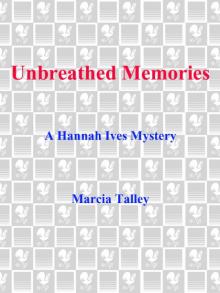 Unbreathed Memories
Unbreathed Memories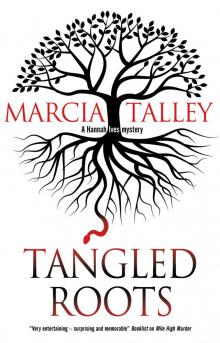 Tangled Roots
Tangled Roots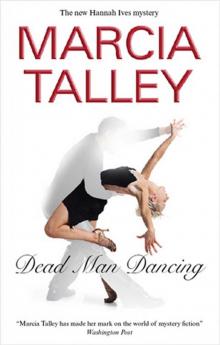 Dead Man Dancing
Dead Man Dancing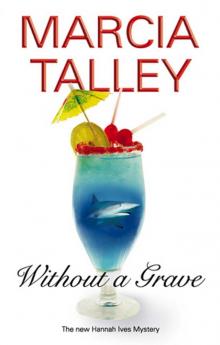 Without a Grave
Without a Grave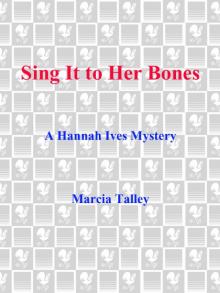 Sing It to Her Bones
Sing It to Her Bones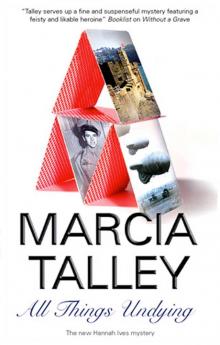 All Things Undying
All Things Undying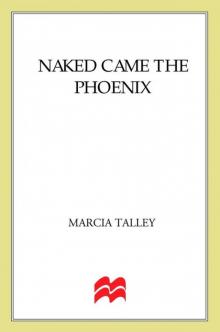 Naked Came the Phoenix
Naked Came the Phoenix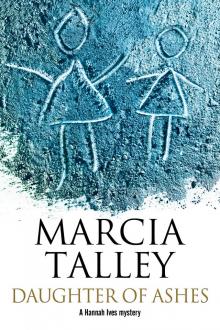 Daughter of Ashes
Daughter of Ashes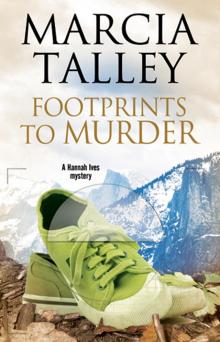 Footprints to Murder
Footprints to Murder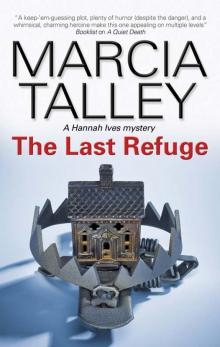 The Last Refuge
The Last Refuge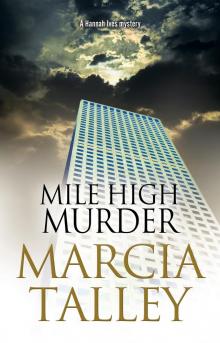 Mile High Murder
Mile High Murder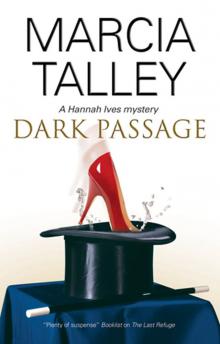 Dark Passage
Dark Passage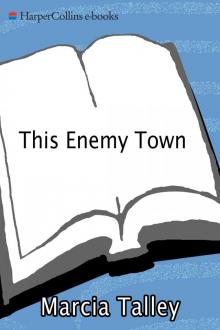 This Enemy Town
This Enemy Town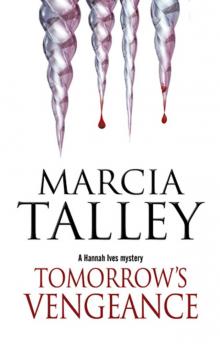 Tomorrow's Vengeance
Tomorrow's Vengeance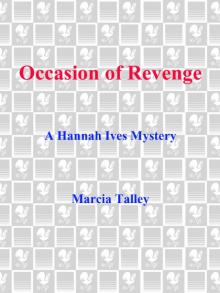 Occasion of Revenge
Occasion of Revenge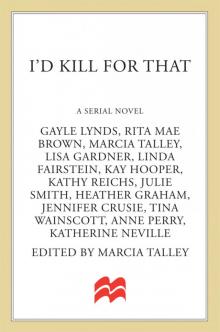 I'd Kill For That
I'd Kill For That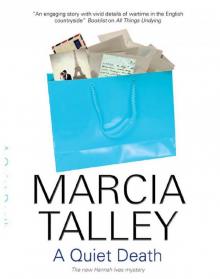 A Quiet Death
A Quiet Death